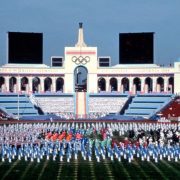The Year Local Entrepreneurs Funded The Olympics
When it came time for cities around the globe to begin bidding to host the 1984 Summer Olympic Games, nobody wanted to volunteer. At the time, hosting the Olympic Games was seen for what it truly is: financially risky.
In the wake of the 1976 Summer Olympic Games, host city Montréal found itself $1.5 billion in debt; an amount the Canadian city was finally able to pay off in just 2006.
Put off by the financial setbacks experienced by Montréal and still grappling with the turmoil and political unrest left by the Cold War, the 1984 Summer Games were not particularly popular when it came to attracting potential host cities. In fact, only two cities even officially bid to host the 1984 Olympic Games: New York City and Los Angeles.
Los Angeles won the bid in the end, but its residents were not enthusiastic about this decision nor were they willing to foot the bill. The people of Los Angeles were so adamant about protecting their tax dollars from wasteful spending that they proceeded to pass a city charter prohibiting the use of public funds to be used for Olympic facilities. The city now had the honor of hosting the Olympic Games, but no way to pay for it.
Fortunately, a local businessman with a reputation for being budget-conscious stepped up and spearheaded the Los Angeles Olympic Organizing Committee (LA84). Comprised of other successful entrepreneurs and business-savvy individuals, the Committee’s goal was simple: find private funding for the Olympic Games, a feat that had never been done before.
Critics were not initially sold on the idea of leaving the fate of the ’84 Olympic Games to a committee of corporate businessmen. However wary they may have been towards the idea of privatization, the 1984 Olympics would go on to be remembered as one of the most successful Olympic Games in history. Not only did the Committee find itself under budget, it also managed to make a profit – something that had only happened once before.
Through private fundraising, corporate sponsorships, and fiscal discipline, the Committee pulled off the unthinkable. Instead of throwing away millions, if not billions, on building new infrastructure, LA84 made use of existing arenas and college sports facilities.
Unheard of at the time, the Committee made history by selling the exclusive broadcasting rights to just one network. The American Broadcasting Company (ABC) paid a modest $225 million to be America’s only source for viewing the Olympic Games.
When it came to housing the Olympians, LA84 chose to make use of college dormitories and other housing facilities spread throughout the city, rather than building a costly “Olympic Village,” which has become customary for host cities.
When all was said and done, the 1984 Los Angeles Summer Olympic Games cost a total of $546 million dollars. When compared to the $50 billion spent on the 2013 Sochi Winter Games, the amount spent by LA84 seems almost minuscule.
Privatization was not only possible, it was also the most efficient way to get the job done.




